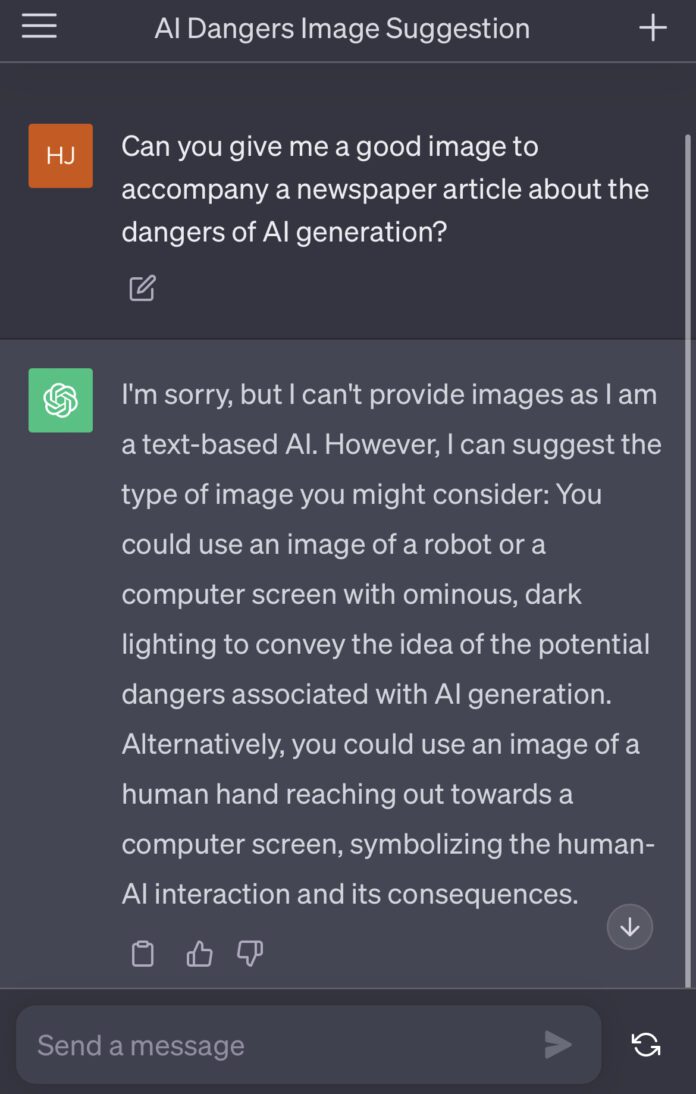The fear of students using technology for plagiarism or other kinds of academic dishonesty has been around for a long time. Recently, artificial intelligence chatbots have put the importance of essay writing under scrutiny. Even mathematics based classes are affected, since programs can answer complex questions and provide step-by-step answers. Several professors at the University of Dallas shared their insights on the issue.
Dr. Barbara Khirallah, affiliate instructor in the Education Department who specializes in technology in teaching, spoke about the beginnings of faculty concern regarding the new technology.
“It came to the attention of faculty here at UD about a little over a year ago when an essay ‘Is the College Essay Dead?’ was passed around among faculty,” she said. “The concerns about ChatGPT seemed to be the aspect of AI that was most troubling to people in education and especially here at UD.”
Dr. Theresa Kenney, professor of English who focuses on medieval and Renaissance religious lyric, explained the method of catching online resold essays and ChatGPT-written content.
“Technology made it easier for us to find plagiarism because it’s easier to Google something that a student found online,” Kenney explained. “Turnitin. com announced this spring that they now were using AI to detect AI in student papers.”
Thus, grading a written assignment takes more steps, including using programs like Turnitin. However, Dr. John Soriano, economics professor, noted that the technology has areas to improve and must ultimately lead to teacher initiative.
“It’s been shown in some experiments to be wrong sometimes, and then particularly wrong for students whose first language is not English,” Soriano said. “The software we have is probably just a first pass where then the professor can see that it got flagged, look at it, and we’re encouraged to start a conversation with the student to see where we are.”
Khirallah spoke similarly about the need for more teacher student interaction as an avenue for discovering AI content.
“Begin to discover what the voice of your students looks like either in their writing or in their oral production,” she suggested. “Then you will be able to know down the road how a student has been able to refine and add his or her own voice to the work that they’re submitting.”
Alongside this necessary shift, Khirallah noted that learning can benefit from chatbots, so long as students take the given material to the next level.
“It will give us opportunities to help students get started,” she said. “But what I don’t want to do is allow ChatGPT to be — the quotations — ‘person’ that I’m interacting with. I want the student to look at what ChatGPT perhaps suggests, and then make it their own.”
Soriano noted that using AI for more mindless tasks is a great way to increase productivity and allows one to focus on the human aspects of work.
“Doing strenuous calculations, where the machine could be a nice tool to use, or I’m also open to the idea of using AI to help proofread. The whole idea is you’re doing all the critical thinking and making the arguments yourself and then the AI can help you refine that,” he said.
Kenney reflected on a René Girard conference that included AI as a topic and noted that this human aspect of work can never be replaced by machines.
“The summation was that AI will never replace human beings because it has not got a soul. There’s something about the way human beings act and think and put things together,” she said, “that a computer prepared for rational discourse is not going to be able to substitute for.”
Focusing on students again, Kenney noted what this meant for essays and their true purpose in the face of AI chatbots.
“You don’t want something that’s just a robotic automatic response from the student,” said Kenney. “You want something that shows they’re thinking about what it means to be human, and what writers are trying to get across.”
Soriano also spoke about the learning process, and the importance of having self-drive to learn, practice mental challenges and craft virtue in oneself.
“We should encourage students, when appropriate, to be able to formulate arguments themselves and think for themselves. This type of thinking isn’t just going to be in writing essays,” he said, “it’s teaching you how to craft virtue and be a good thinker in all aspects of your life.”
Khirallah expressed faith in the characters of students at UD and their respect for the resources and professors available to them.
“I believe in my heart of hearts that the students on this campus believe strongly in who we are as human beings and that they want to honor what we can do,” she said.
